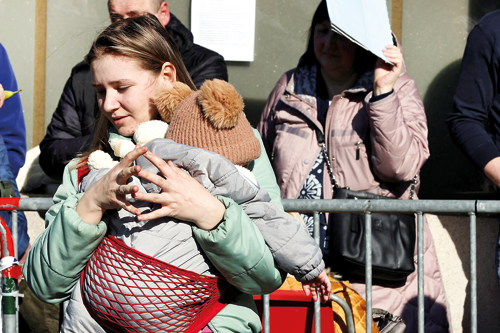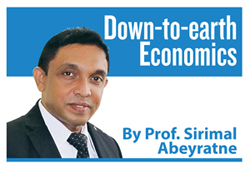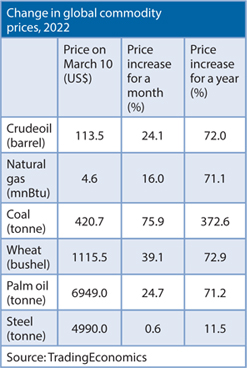Russia-Ukraine war impact on Sri Lanka
View(s):
A woman holds a child as people wait outside an immigration office after fleeing from Ukraine to Belgium, following Russia's invasion of Ukraine, in Brussels, Belgium March 10, 2022. REUTERS/Yves Herman
Before it dismantled in 1991, the Soviet Union comprised 14 countries from both Northern Asia and Eastern Europe, extending over 20 million square km of land unevenly occupied by over 290 million people. Its official title was the Union of Soviet Socialist Republics (USSR) which had Russia as the most influential and most populated partner country of the Union and, of course, Ukraine as its second most influential partner country.
On December 25, 1991, the last few steps of dissolving the Soviet Union began. The last President of the Soviet Union, Mikhail Gorbachev resigned, the office became extinct and the Soviet Union flag was lowered. After that, it was Russia and other independent states, including Ukraine.
Today, 20 years after the dismantling of the Soviet Union, Russia has invaded Ukraine. I thought of bringing this new issue to our discussion and, shedding some light on its far-reaching economic consequences that Sri Lanka must face. It is much more than an isolated incident in the world, because the economic consequences of the Russia-Ukraine war are overwhelming on the world economy.
Estranged relationship
The global economic impact of the Russian-Ukraine war depends on two factors: The first is the importance of these two countries in the world economy. The second is the involvement of the rest of the world in the war – particularly the US and the European countries, as some thought pushing it towards a “world war”.
In fact, Ukraine’s distancing relationship with its former ally Russia and, instead, its growing affection towards the European Union (EU) and the North Atlantic Treaty Organisation (NATO) were the underlying factors of the sharp cracks between the two countries. Many of the former Soviet Union partner countries as well as the former Communist countries of Eastern Europe have already become members of either the EU or the NATO or both.
Russia is the largest country in the world by its land size, while it is one of the biggest in terms of its large population over 145 million. It is a US$ 1.5 trillion economy, with over $12,000 per capita GDP. As far as its economic progress is concerned, however, Russia had a historical economic problem; it was unable to produce any important manufactured item that could be demanded in the world market, of course, other than military hardware and astronomical hardware.
But, thanks to its natural resources and abundant agricultural land, the Russian economy is dependent on its “primary” exports – oil, gas, coal, gold and other mineral resources as well as wheat, sunflower seeds, potatoes, milk etc. The country is one of the world’s largest suppliers of crude oil, natural gas, coal and wheat.
Russia is also the world’s largest producer of “asbestos” – the name comes from “Asbest city” where it is produced. Russia exports 80 per cent of its asbestos output, but the irony is that it is a banned commodity in more than 60 countries in the world due to its health hazards.
“Breadbasket in Europe”
Ukraine, on the other hand, is a smaller country with 40 million people, and poorer than Russia. But it has fertile agricultural land and a rich industrial raw material base. The size of the economy is about $150 billion, with per capita GDP little over $3,000.
The country is known as the “breadbasket of Europe” because it is one of the largest wheat producers in Europe and one of the largest wheat exporters in the world. Ukraine’s total exports account for about $50 billion, compared to over $330 billion in Russia. Major exports include wheat and other cereals, and iron and steel as industrial raw materials.
The direct impact of the Russian-Ukraine war on the world economy comes from the disruption to world trade. Two major commodities which can have a massive impact on the world economy are energy and food for which both Russia and Ukraine have been among the largest suppliers. The EU has been the main export destination for both these countries, while their bilateral trade doesn’t seem to be large.
The oil and food prices in the world market have been rising as the global demand and economic recovery gained momentum, but the current price increase against the war has been huge. In fact, the EU as well as the UK have been considering ways and means of shifting their source markets from Russia to other countries – a move that has angered Russia even more.
Moreover, the US, EU, UK and Canada have considered imposing economic and financial sanctions over Russia; one of the early moves in this direction was to remove seven Russian banks from using the SWIFT code – an international bank messaging system facilitating safe and efficient money transfers across the world. While this is a major blow to Russia’s international trade with the rest of the world, it effectively affects both sides.
The global spillover effects of the war and of the sanctions on other countries are momentous, as per the preliminary investigations by the IMF and the World Bank. While the economic recovery from COVID-19 is undermined, the escalating commodity prices further add to the inflationary pressures. While no country can escape the economic turmoil, the poor and the vulnerable countries will be hit the hardest.
 Vulnerable countries
Vulnerable countries
When individual countries face the external shocks such as the Russian-Ukraine war or the pandemic, their economic response is different due to differences in their vulnerability to these shocks. If they have built up their balance of payments, reserve position, fiscal management, and other macroeconomic fundamentals, then they can stand strong against external shocks.
 In that sense, Sri Lanka’s ability to stand against another external shock with no time to recover from the pandemic would be detrimental to the economy, because Sri Lanka is not prepared to face such shocks. As far as the Russian-Ukraine war impact is concerned, what immediately comes to our mind is the country’s trade and tourism relations with these two countries. Sri Lanka’s trade with both Russia and Ukraine is rather small, although they are important destination markets for a couple of export commodities and a similar source markets for a few import commodities. But from a crisis-ridden Sri Lankan point of view, no matter how small they are, it is critically important to the country.
In that sense, Sri Lanka’s ability to stand against another external shock with no time to recover from the pandemic would be detrimental to the economy, because Sri Lanka is not prepared to face such shocks. As far as the Russian-Ukraine war impact is concerned, what immediately comes to our mind is the country’s trade and tourism relations with these two countries. Sri Lanka’s trade with both Russia and Ukraine is rather small, although they are important destination markets for a couple of export commodities and a similar source markets for a few import commodities. But from a crisis-ridden Sri Lankan point of view, no matter how small they are, it is critically important to the country.
Nevertheless, the bigger repercussions to the Sri Lankan economy come through the global spillover effects of the war, mainly through escalating world market prices of energy and food. Having already faced with an unprecedented foreign exchange crisis, domestic supply shortages and rising inflation, potentially escalating world prices would create major blows to weaker economies such as Sri Lanka.
The spillover effects of the war can worsen further, if the US, UK and the EU countries step forward intensifying their involvement in the war and supporting Ukraine. However, it is not an easy choice for them as they should anticipate severe repercussions. Even Ukraine seems to have overestimated their support, while underestimating Russia’s reaction.
(The writer is a Professor of Economics at the University of Colombo and can be reached at sirimal@econ.cmb.ac.lk and follow on Twitter @SirimalAshoka).
Hitad.lk has you covered with quality used or brand new cars for sale that are budget friendly yet reliable! Now is the time to sell your old ride for something more attractive to today's modern automotive market demands. Browse through our selection of affordable options now on Hitad.lk before deciding on what will work best for you!


